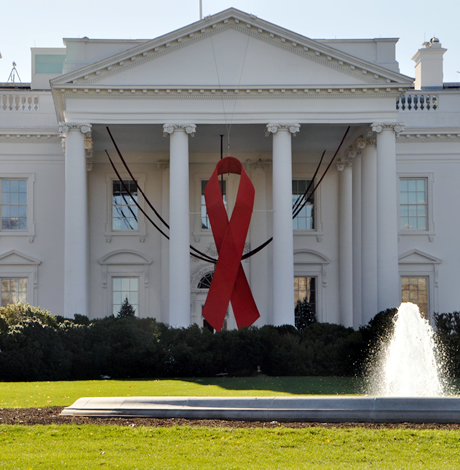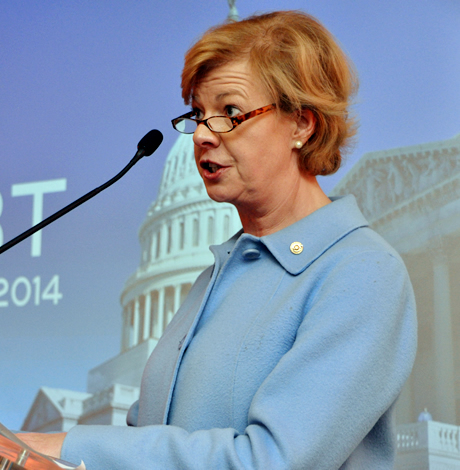News
Trump fires all members of HIV/AIDS council without explanation


President Trump has fired all members of the President’s Advisory Council on HIV/AIDS. (Washington Blade file photo by Michael Key)
With no explanation, the White House has terminated members of the Presidential Advisory Council on HIV/AIDS amid widespread discontent with President Trump’s approach to the epidemic.
After six members of PACHA resigned in June, the White House on Wednesday terminated the remaining 16 members without explanation via a letter from FedEx.
Scott Schoettes, a Chicago-based HIV/AIDS activist and senior attorney for Lambda Legal, was one of the six who resigned in June over Trump’s inaction on HIV/AIDS and said on Twitter the remaining members were fired.
“No respect for their service,” Schoettes said. “Dangerous that #Trump and Co. (Pence esp.) are eliminating few remaining people willing to push back against harmful policies, like abstinence-only sex ed.”
Remaining #HIV/AIDS council members booted by @realDonaldTrump. No respect for their service. Dangerous that #Trump and Co. (Pence esp.) are eliminating few remaining people willing to push back against harmful policies, like abstinence-only sex ed. #WeObject #PACHA6 #Resist
— Scott A. Schoettes (@PozAdvocate) December 28, 2017
Sources with knowledge of PACHA said many council members were fired even though additional time remained on their terms as advisers. The terminated members, sources said, were given the option to reapply after Tuesday.
Gabriel Maldonado, CEO of the Riverside, Calif.,-based LGBT and HIV/AIDS group Truevolution, was a remaining member of PACHA and confirmed they were fired, but said the “explanation is still unclear.”
“I can only speculate,” Maldonado said. “Like any administration, they want their own people there. Many of us were Obama appointees. I was an Obama appointee and my term was continuing until 2018.”
Maldonado said “ideological and philosophical differences” with the administration are a potential reason for the terminations.
As an example, Maldonado cited a recent Washington Post report the Centers for Disease Control is banned from using words like “diversity” and “transgender” in budget documents. The CDC director has denied those words are banned.
“I was co-chair of the disparities committee, so much of my advocacy and policy references surrounded vulnerable populations, addressing issues of diverse communities, specifically looking at the impacts of the LGBT community, namely, the disproportionate impact of HIV and AIDS to people of color, gay men, transgender women,” Maldonado said. “And a lot of those key vulnerable populations are not being prioritized in this administration.”
Maldonado added he intends to publish an open letter to the community about his termination on Friday.
Also among the terminated members was Patrick Sullivan, a professor of epidemiology at the Emory University Rollins School of Public Health.
“My reaction is that our focus should be on the policies that PACHA addresses,” Sullivan said. “These issues are critical to people’s health, and are critical to making new HIV infections rare. At PACHA’s last meeting in August, the Council urged the Administration to affirm the National HIV/AIDS Strategy through 2020. Doing this would be a great way for the administration to set the tone and lay out national roadmap of priorities for a new PACHA.”
Created in 1995, PACHA has provided advice starting in the Clinton administration and into the George W. Bush and Obama administrations on policy and research to promote effective treatment and prevention for HIV — maintaining the goal of finding a cure.
In September, Trump signed an executive order that renewed PACHA along with 31 other presidential bodies for an additional year.
Trump’s termination of council members isn’t the first time an administration cleaned house on PACHA. The Obama administration eliminated all of George W. Bush’s appointees before making new appointments.
Kaye Hayes, executive director of PACHA, affirmed the council members were terminated on Wednesday, but said there’s more to the story.
“They were also thanked for their leadership, dedication and commitment to the effort,” Hayes said. “Changing the makeup of federal advisory committee members is a common occurrence during Administration changes. The Obama administration dismissed the George W. Bush administration appointees to PACHA in order to bring in new voices. All PACHA members are eligible to apply to serve on the new council that will be convened in 2018.”
Jim Driscoll, a gay Nevada-based HIV/AIDS activist who supported Trump in 2016, said replacement of PACHA members “is standard practice” for a new administration.
“Now they need to find bonafide community people with appropriate expertise and the ability to adapt to the changed political circumstances,” Driscoll said. “It is fully understandable why a president would not want people who oppose his policies and might be happy to see him impeached serving as his HIV advisors. That would serve the needs of neither the president nor of people living with HIV-AIDS.”
But Maldonado said the termination of PACHA members during the Trump administration is only partially consistent with the Obama years.
“It is common for appointees to be terminated and for folks to kind of want their own people in,” Maldonado said. “I think where the discrepancy comes in is why a year later, No. 1? Two, many of us, our terms were over earlier this year and we were sworn back in, and three were stayed on nearly four months after an executive order was signed continuing the council.”
In June, six members of PACHA resigned their posts in protest over what they called inaction from Trump on the global HIV/AIDS epidemic. An estimated 1.2 million people have HIV/AIDS in the United States and 37 million have the disease worldwide.
Chief among the reasons was the absence of leadership at the White House on HIV/AIDS. To date, the White House has yet to appoint a director of the Office of National AIDS Policy, which was one of the reasons the six members of PACHA resigned in June.
Trump’s fiscal year 2018 budget proposal also sought massive cuts to HIV/AIDS programs, including $150 million on HIV/AIDS programs at the Centers for Disease Control and more than $1 billion in cuts from global programs like the PEPFAR Global Fund to Fight AIDS, Tuberculosis & Malaria. The Republican-controlled Congress has thus far continued to fund these programs at previous levels.
Maldonado noted the PACHA terminations are taking place at the year’s end after the June resignations, which he said is “a little too coincidental.”
“The timing is a little bit unorthodox compared to what the Obama administration’s approach was,” Maldonado said.
Maldonado said he represented a younger demographic on PACHA as the only member under the age of 30, which he said is where the majority of new HIV infections are occurring, and as a young, black gay man.
“I just am coming to the acknowledgment that the traditional tactics of politicking and policy and strategy and negotiation, the kind of standard tools that we’re trying to use, that the status quo is no longer acceptable,” Maldonado said. “The tactics that we had are kind of obsolete, and now we need to craft new strategy to address the troubling and unsettling revelations, particularly around the silence and inaction that have taken place around HIV and AIDS.”
Since the resignations in June, Trump has made public statements on HIV/AIDS consisting of proclamations on National HIV Testing Day and World AIDS Day. Neither statement included an explicit mention of LGBT people, who have faced the brunt of the disease.
The White House deferred comment to the Department of Health & Human Services, which provided the statement from the PACHA executive director.
New appointments may be coming soon. The Blade reported in October gay Republicans familiar with HIV/AIDS issues and LGBT issues have been among those contacted by a Trump administration official for possible appointments to PACHA.
Kansas
ACLU sues Kansas over law invalidating trans residents’ IDs
A new Kansas bill requires transgender residents to have their driver’s licenses reflect their sex assigned at birth, invalidating current licenses.

Transgender people across Kansas received letters in the mail on Wednesday demanding the immediate surrender of their driver’s licenses following passage of one of the harshest transgender bathroom bans in the nation. Now the American Civil Liberties Union is filing a lawsuit to block the ban and protect transgender residents from what advocates describe as “sweeping” and “punitive” consequences.
Independent journalist Erin Reed broke the story Wednesday after lawmakers approved House Substitute for Senate Bill 244. In her reporting, Reed included a photo of the letter sent to transgender Kansans, requiring them to obtain a driver’s license that reflects their sex assigned at birth rather than the gender with which they identify.
According to the reporting, transgender Kansans must surrender their driver’s licenses and that their current credentials — regardless of expiration date — will be considered invalid upon the law’s publication. The move effectively nullifies previously issued identification documents, creating immediate uncertainty for those impacted.
House Substitute for Senate Bill 244 also stipulates that any transgender person caught driving without a valid license could face a class B misdemeanor, punishable by up to six months in jail and a $1,000 fine. That potential penalty adds a criminal dimension to what began as an administrative action. It also compounds the legal risks for transgender Kansans, as the state already requires county jails to house inmates according to sex assigned at birth — a policy that advocates say can place transgender detainees at heightened risk.
Beyond identification issues, SB 244 not only bans transgender people from using restrooms that match their gender identity in government buildings — including libraries, courthouses, state parks, hospitals, and interstate rest stops — with the possibility for criminal penalties, but also allows for what critics have described as a “bathroom bounty hunter” provision. The measure permits anyone who encounters a transgender person in a restroom — including potentially in private businesses — to sue them for large sums of money, dramatically expanding the scope of enforcement beyond government authorities.
The lawsuit challenging SB 244 was filed today in the District Court of Douglas County on behalf of anonymous plaintiffs Daniel Doe and Matthew Moe by the American Civil Liberties Union, the ACLU of Kansas, and Ballard Spahr LLP. The complaint argues that SB 244 violates the Kansas Constitution’s protections for personal autonomy, privacy, equality under the law, due process, and freedom of speech.
Additionally, the American Civil Liberties Union filed a temporary restraining order on behalf of the anonymous plaintiffs, arguing that the order — followed by a temporary injunction — is necessary to prevent the “irreparable harm” that would result from SB 244.
State Rep. Abi Boatman, a Wichita Democrat and the only transgender member of the Kansas Legislature, told the Kansas City Star on Wednesday that “persecution is the point.”
“This legislation is a direct attack on the dignity and humanity of transgender Kansans,” said Monica Bennett, legal director of the ACLU of Kansas. “It undermines our state’s strong constitutional protections against government overreach and persecution.”
“SB 244 is a cruel and craven threat to public safety all in the name of fostering fear, division, and paranoia,” said Harper Seldin, senior staff attorney for the ACLU’s LGBTQ & HIV Rights Project. “The invalidation of state-issued IDs threatens to out transgender people against their will every time they apply for a job, rent an apartment, or interact with police. Taken as a whole, SB 244 is a transparent attempt to deny transgender people autonomy over their own identities and push them out of public life altogether.”
“SB 244 presents a state-sanctioned attack on transgender people aimed at silencing, dehumanizing, and alienating Kansans whose gender identity does not conform to the state legislature’s preferences,” said Heather St. Clair, a Ballard Spahr litigator working on the case. “Ballard Spahr is committed to standing with the ACLU and the plaintiffs in fighting on behalf of transgender Kansans for a remedy against the injustices presented by SB 244, and is dedicated to protecting the constitutional rights jeopardized by this new law.”
National
After layoffs at Advocate, parent company acquires ‘Them’ from Conde Nast
Top editorial staff let go last week

Former staff members at the Advocate and Out magazines revealed that parent company Equalpride laid off a number of employees late last week.
Those let go included Advocate editor-in-chief Alex Cooper, Pride.com editor-in-chief Rachel Shatto, brand partnerships manager Erin Manley, community editor Marie-Adélina de la Ferriére, and Out magazine staff writers Moises Mendez and Bernardo Sim, according to a report in Hollywood Reporter.
Cooper, who joined the company in 2021, posted to social media that, “Few people have had the privilege of leading this legendary LGBTQ+ news outlet, and I’m deeply honored to have been one of them. To my team: thank you for the last four years. You’ve been the best. For those also affected today, please let me know how I can support you.”
The Advocate’s PR firm when reached by the Blade said it no longer represents the company. Emails to the Advocate went unanswered.
Equalpride on Friday announced it acquired “Them,” a digital LGBTQ outlet founded in 2017 by Conde Nast.
“Equalpride exists to elevate, celebrate and protect LGBTQ+ storytelling at scale,” Equalpride CEO Mark Berryhill said according to Hollywood Reporter. “By combining the strengths of our brands with this respected digital platform, we’re creating a unified ecosystem that delivers even more impact for our audiences, advertisers, and community partners.”
It’s not clear if “Them” staff would take over editorial responsibilities for the Advocate and Out.

In an official statement released at the reveal event Capital Pride Alliance described its just announced 2026 Pride theme of “Exist, Resist, Have the Audacity” as a “bold declaration affirming the presence, resilience, and courage of LGBTQ+ people around the world.”
The statement adds, “Grounded in the undeniable truth that our existence is not up for debate, this year’s theme calls on the community to live loudly and proudly, stand firm against injustice and erasure, and embody the collective strength that has always defined the LGBTQ+ community.”
In a reference to the impact of the hostile political climate, the statement says, “In a time when LGBTQ+ rights and history continue to face challenges, especially in our Nation’s Capital, where policy and public discourse shape the future of our country, together, we must ensure that our voices are visible, heard, and unapologetically centered.”
The statement also quotes Capital Pride Alliance CEO and President Ryan Bos’s message at the Reveal event: “This year’s theme is both a declaration and a demand,” Bos said. “Exist, Resist, Have Audacity! reflects the resilience of our community and our responsibility to protect the progress we’ve made. As we look toward our nation’s 250th anniversary, we affirm that LGBTQ+ people have always been and always will be part of the United States’s history, and we will continue shaping its future with strength and resolve,” he concluded.
-

 Mexico5 days ago
Mexico5 days agoUS Embassy in Mexico issues shelter in place order for Puerto Vallarta
-

 Netherlands4 days ago
Netherlands4 days agoRob Jetten becomes first gay Dutch prime minister
-

 Sports4 days ago
Sports4 days agoMore than a dozen LGBTQ athletes medal at Olympics
-

 Books3 days ago
Books3 days agoNew book profiles LGBTQ Ukrainians, documents war experiences

















